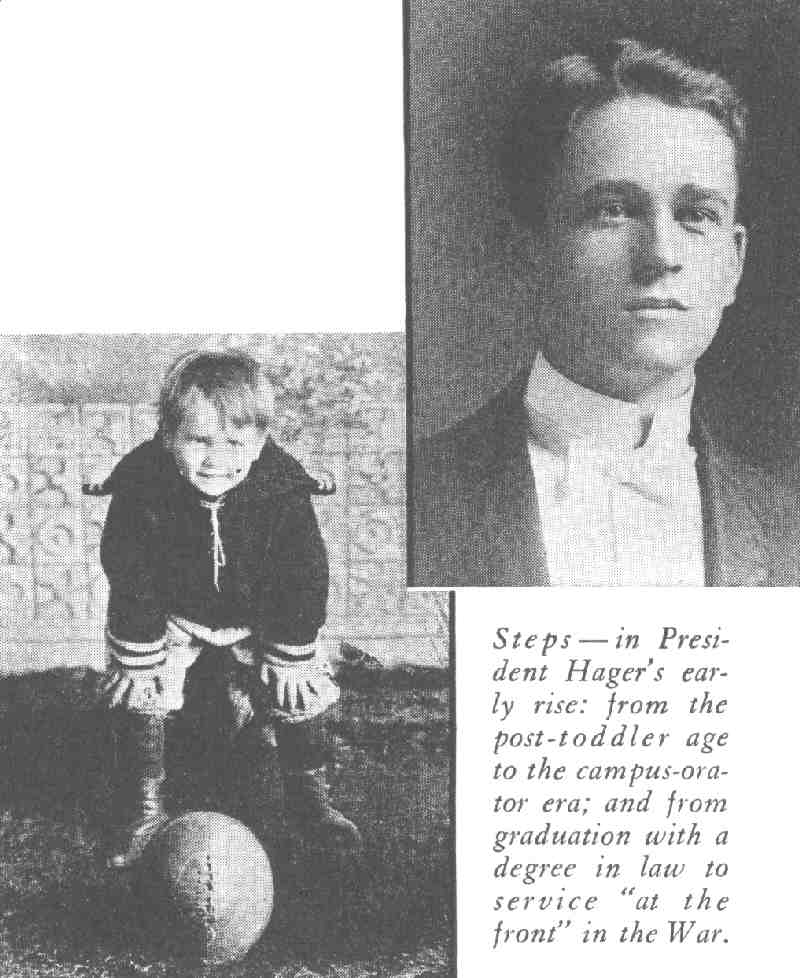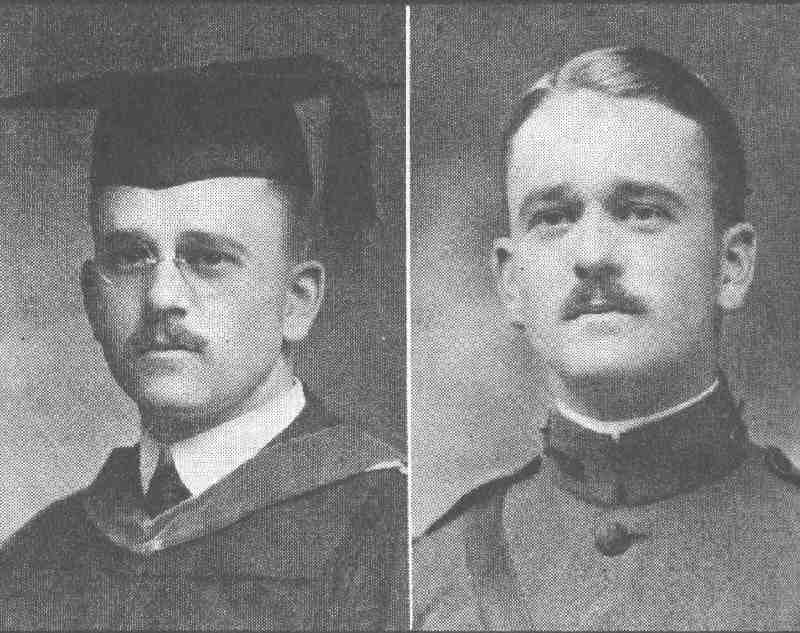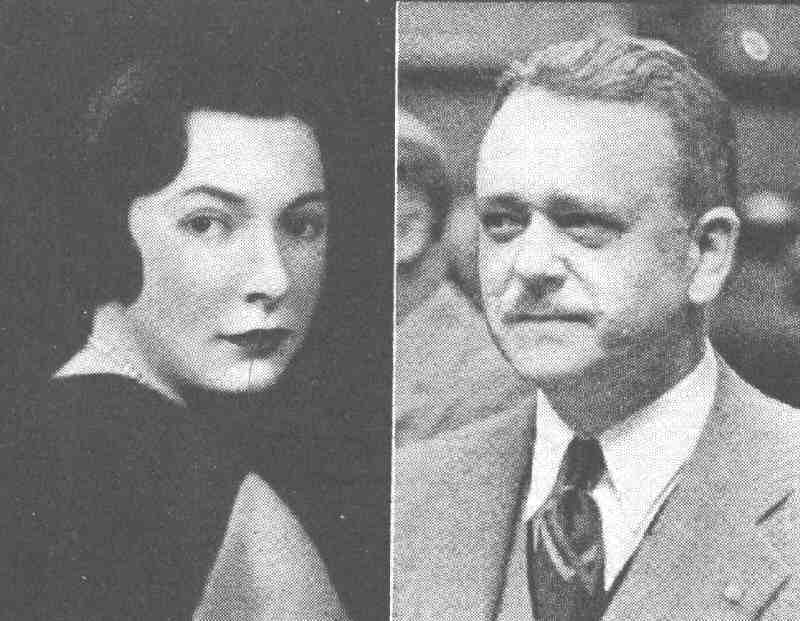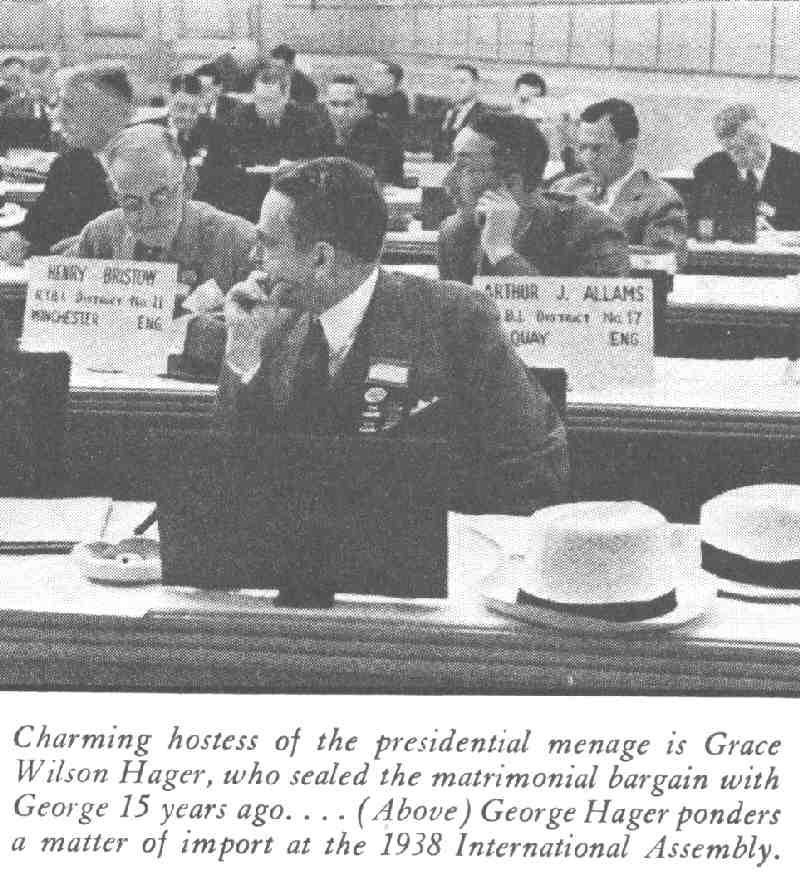

|
| SEARCH |
George C. Hager 1938-39 |
 |
| THE 17‑year‑old college orator
paused to silhouette his next phrase. "While in pursuit of the
glittering gewgaws of pleasure," he warned, "we are apt to forget the
outcome of modern institutions." And even as he spoke, a modern institution over which he himself was to preside 28 years later‑and whose outcome he could never forget‑was taking its first form. The orator was George Caldwell Hager. The institution was the first association of Rotary Clubs. The year‑for the sake of the record‑was 1910. Yes, today George Hager is President of Rotary International. The fact does not surprise me. To one who has watched his progression in Rotary and in the business world, his election seems but a high point in a logical sequence of events. The fact is, folks have always expected George to do things rapidly‑and well‑and to mature speedily on any job. He himself set the pace when he squeezed four years of college work into two and a half, became a high-school principal at 18, and won admittance to the bar at 22. But perhaps I'm getting ahead of my story. I haven't properly brought George upon the scene. The first Hager to reach North American shores came during the Colonial Revolution as an officer in the Hessian mercenaries. Deciding that the cause of the colonists was just, he transferred his allegiance, and joined George Washington's staff. After the war he settled in Virginia, and during the Civil War between the States another Colonel Hager served with General Stonewall Jackson. That was George's paternal grandfather. It is interesting to note that George's maternal grandfather, a Presbyterian clergyman, served in the same war as a chaplain-at‑large, one of two serving in this capacity in the Confederate forces. The colonel's son, John Jackson Hager II, and the chaplain's daughter, Maude Livingstone Caldwell, were married, and to them were born four sons, of whom the second was George Caldwell. George was born in Bristol, a town in the tree‑tufted, brook‑riven hills of eastern Tennessee. His birth date was January 1. That date! What wouldn't a numerologist make of it! George, however, is of the school that thinks "any day makes a good birthday!" The John Jackson Hagers were a happy family‑a harmonious sextette. Here was an earnest, deeply religious home‑yet one peopled with merry, and sometimes Puckish, hearts. When George was 8, his father gave him a typewriter. In one of his first encounters with the machine, he poked out, small‑boy fashion, the following note which was addressed to his father, in whose general store George had been working: Dear Sir. I would like to have some of the money you owe me, I hate to ask but I am dead broke. You will find your full account below. I would like to have as much as possible. J. J. Hagers Account 5dollars and 75 cts George C. Hager  What
a chuckle of pride George's father must have enjoyed , The good fun in
that note and in many others I found tucked, away in a scrapbook in
George's library, leads me to think that here was one of the most
affectionate and inspiring of families. No achievement,. however small,
even by the smallest youngsters in the group, ever went unnoted. Did one
of the boys graduate from grammar school, he found himself promptly
flooded with cheering letters and "wires" from parents, brothers, aunts,
uncles, and cousins. What
a chuckle of pride George's father must have enjoyed , The good fun in
that note and in many others I found tucked, away in a scrapbook in
George's library, leads me to think that here was one of the most
affectionate and inspiring of families. No achievement,. however small,
even by the smallest youngsters in the group, ever went unnoted. Did one
of the boys graduate from grammar school, he found himself promptly
flooded with cheering letters and "wires" from parents, brothers, aunts,
uncles, and cousins.George grew. Putting high school behind him at 16, he entered King College in Bristol, and there, contemplating the ministry as his lifework, he concentrated his youthful enthusiasms on oratory. The Athenaeans, his campus literary society, used to hear him regularly, on such themes as the Epic of Our National Life and The Working Principles of American Life. But George found time for serious study, for part‑time work, and for participation in all the campus sports. He ‑was, by the way, a hard man to match on the cinder track and on the basketball court. AT 18, as I have said, George became Professor G. C. Hager, principal of the high school‑ at Wyndale, Virginia. There had been, his school board conceded, an onerous disciplinary problem before he came. There wasn't afterward. One day, for instance, he received this note from a sadly perplexed and baffled parent: Mr. Hagy: i will Send my daughter Back to school and i want you to Correct heare and make heare mind you and do what you tell heare to do and if She disabyes your orders you must whip heare and make heare mind you. George doesn't recall that such stringent measures as the father recommended were necessary, but many an old‑timer in Wyndale remembers the young man who by kind but unswervable firmness made a decent, studious school out of what had been a nerve‑ravelling "roughhouse." There followed then for George two years as head of the Latin department of the high school at Knoxville, Tennessee‑and new plans for a career. Law had now become his absorbing interest. Accordingly he began to study in the law department of the University of Tennessee and to read in a local law office. He was admitted to the Tennessee bar, in 1915 and a year later took his degree in law. Maybe there's a prophetic note in the fact that George's highest grades came in corporation law‑for today that's the branch of law in which he works almost exclusively.  George
had just set up his practice‑one that, while lean at first, gave
prospects of later amplitude‑when the World War came along. He enlisted
as a private in 1917, obtained a commission in France, and served at the
front as a lieutenant of the field artillery. He is at present a major
in the Reserve Corps. George, like many another ex‑service man, is
taciturn about the War days. But it is possible that the psychological
experience of those years left a residue in his sub consciousness which
now seeks expression in his vital interest in Rotary's Fourth
Object‑International Service. George
had just set up his practice‑one that, while lean at first, gave
prospects of later amplitude‑when the World War came along. He enlisted
as a private in 1917, obtained a commission in France, and served at the
front as a lieutenant of the field artillery. He is at present a major
in the Reserve Corps. George, like many another ex‑service man, is
taciturn about the War days. But it is possible that the psychological
experience of those years left a residue in his sub consciousness which
now seeks expression in his vital interest in Rotary's Fourth
Object‑International Service.Back from the War, George came to Chicago in 1920, where, on the basis of his pre‑War law experience, the Cook County Supply Company employed him to help it consolidate with its several subsidiary corporations. Out of this and several other reorganizations came , the Consumers Company of Illinois, the largest combined coal, ice, and building‑materials corporation in the United States. George is its secretary. George has this business institution‑or rather a man' then in it‑to thank for his introduction to Rotary. And, conversely, Rotary has that man to thank for George. Marshall Keig, then executive vice‑president of the company, was a member of the Chicago Rotary Club at the time and invited George to share his membership. "I didn't need a second invitation," George says, "for I used to hear great things about Rotary in Knoxville from some of my older lawyer friends." One of the fine aspects of Rotary is the spirit with which men accept the responsibilities of Committee membership. George accepted them‑from the start. In fact, he welcomed them. His interest in the Membership Committee of the Chicago Rotary Club led to his Chairmanship of that group (in his 11 years in the Club he has added 50 members to the roll). A term on the Board of Directors followed. He was elected President of the Club for 1932‑33 and administered a very successful year, proving an able speaker, a fluent and charming toastmaster, and an affable host. He had, and has, an uncanny memory. for names. During his term he could thumb the pages of the roster and call every member by his Tom, Dick, or Elmer, looking only at his picture. That was no inconsiderable feat in "Old Number One” ‑with its approximately 600 members.  George
presided at board meetings with dignity and aplomb, and no phase of the
more than complicated mechanism was too trivial for his specialized
interest and Action. While he paid strict attention to, his business, he
ate and slept with Rotary and, he began to interest himself in the
details of Rotary International. His horizon rising above the Chicago
Rotary Club, he was made a member of the Foundation Committee of Rotary
International, in which activity he was recognized as a, serious worker.
His reward was more work. George
presided at board meetings with dignity and aplomb, and no phase of the
more than complicated mechanism was too trivial for his specialized
interest and Action. While he paid strict attention to, his business, he
ate and slept with Rotary and, he began to interest himself in the
details of Rotary International. His horizon rising above the Chicago
Rotary Club, he was made a member of the Foundation Committee of Rotary
International, in which activity he was recognized as a, serious worker.
His reward was more work.His continuous service in the affairs of Rotary International since 1932‑as a Director and as member of many Committees, attests to his indefatigability. As if George didn't have enough to do, he has found time within the last few years to serve as president of the Chicago Federal Savings and Loan Association and as an officer and director in many other corporations., He is active in many trade associations in his business field, and belongs to various patriotic societies and to Sigma Alpha Epsilon fraternity. Does the man ever relax? Yes! By trotting out one of his three hobbies: deep‑sea fishing, stamp collecting, and reading biography. And George is no tyro in any of these departments. There's nothing like tussling with a 186 1/2 ‑pound tarpon for an hour or two‑as he did once in the Gulf of Mexico‑to clear a man's mind for a tussle with the realities of living, George thinks. Yes, he got the fish! George has one other hobby‑at least for him it's a diversion rather than a duty. Writing to relatives! The old family unity persists even though George's father died some years ago. The mother and her four sons give mail routes between them little rest. Those three brothers, with whom from their father George first learned the principles of fair play in masculine society, deserve mention. Clint, the oldest son, was, for many years, United States district attorney at Atlanta, Georgia; John Jackson III, the third son, is in the United States postal service in Bristol, Tennessee; and Richard, the fourth son, is manager of the Eastern Air Lines in Atlanta. The boys are proud of each other.  But
have we forgotten the President's lady? We have not! We are saving,
well, the best for almost the last. Grace Leslie Wilson added Hager to
her name 15 years ago. Her father is a retired United States Army
colonel, Jennings B. Wilson, living in San Francisco, and she numbers
Roger Williams, Captain Spier Spencer, and General Richard A. Sarle
among her ancestors. But
have we forgotten the President's lady? We have not! We are saving,
well, the best for almost the last. Grace Leslie Wilson added Hager to
her name 15 years ago. Her father is a retired United States Army
colonel, Jennings B. Wilson, living in San Francisco, and she numbers
Roger Williams, Captain Spier Spencer, and General Richard A. Sarle
among her ancestors.Now Grace Hager is no "Rotary widow." Not only does she smile approval on George's efforts as businessman and Rotarian; she urges him on. Comely, understanding, a perfect, hostess, Grace will surely deserve .50 percent of the credit due the Hager household when these 12 months are spent. BUT lest my hopes for the year seem overly sanguine, listen to pioneer veteran member William Jenson, the first Secretary of the first Rotary Club: "He has the experience, years, temperament, and ability to qualify fully for this great and honored position. I predict this coming year to be the best year for Rotary with its new general‑George C. Hager." They used to call the new President "Caldwell" at home‑because there were at least a half dozen other Georges in his wide family. relationship. But in the list of Rotary's 28 Presidents, ‑"George" is a name unique. Yes, I think Rotary may safely take the "let George do it" attitude‑as far as George's part of the vast assignment goes. But Rotary‑as. every President and as every Rotarian has always well known‑is not a one-man ‑assignment. It's a job, rather, for 199,000 stouthearted men of goodwill round the wide world. Written for the August 1938 Issue of The Rotarian by Bradley C. Downing, Rotary Club of Chicago, Illinois |
RGHF members, who have been invited to this page, may register RGHF members, who have been invited to this page, may register If a DGE/N/D joins prior to their year, they will have more exposure to Rotary's Global History by their service year. This will be beneficial to all concerned. *Based on paid members, subscribers, Facebook friends, Twitter followers, mobile app users, History Library users, web pages, and articles about Rotary's Global History RGHF Home | Disclaimer | Privacy | Usage Agreement | RGHF on Facebook | Subscribe | Join RGHF | |